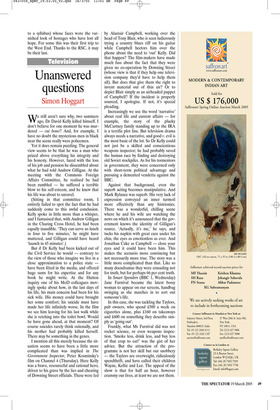Unanswered questions
Simon Hoggart
We still aren’t sure why, two summers ago, Dr David Kelly killed himself. I don’t believe for one moment he was murdered — cui bono? And, for example, I have no doubt the mysterious men in black near the scene really were policemen.
Yet it does remain puzzling. The general view seems to be that he was a man who prized above everything his integrity and his honesty. However, faced with the loss of his job and pension he dissembled about what he had told Andrew Gilligan. At the meeting with the Commons Foreign Affairs Committee, he realised he had been rumbled — he suffered a terrible blow to his self-esteem, and he knew that his life was about to unravel.
(Sitting in that committee room, I entirely failed to spot the fact that he had suddenly come to this awful conclusion. Kelly spoke in little more than a whisper, and I fantasised that, with Andrew Gilligan in the Charing Cross Hotel, he had been equally inaudible. ‘They can serve us lunch in four to five minutes,’ he might have muttered, and Gilligan could have heard ‘launch in 45 minutes’.) But if Dr Kelly had been kicked out of the Civil Service he would — contrary to the view of those who imagine we live in a close approximation to a police state have been fêted in the media, and offered huge sums for his expertise and for any book he might write. At the Hutton inquiry one of his MoD colleagues movingly spoke about how, in the last days of his life, his main concern had been for his sick wife. His money could have brought her some comfort; his suicide must have made her life infinitely worse. In the film we see him leaving for his last walk while she is retching into the toilet bowl. Would he have gone ahead, at that moment? Of course suicides rarely think rationally, and his mother had probably killed herself. There may be something in the genes.
I mention all this merely because the situation seems to have been a little more complicated than was implied in The Government Inspector, Peter Kosminsky’s film on Channel 4 (Thursday). Here Kelly was a brave, resourceful and rational hero, driven to his grave by the lies and cheating of Downing Street officials. These were led by Alastair Campbell, working over the head of Tony Blair, who is seen ludicrously trying a country blues riff on his guitar while Campbell hectors him over the phone about the need to ‘out’ Kelly. Did that happen? The film-makers have made much fuss about the fact that they were given no co-operation by Downing Street (whose view is that if they help one television company they’d have to help them all). But does that give them the right to invent material out of thin air? Or to depict Blair simply as an airheaded puppet of Campbell? If the incident is properly sourced, I apologise. If not, it’s special pleading.
Increasingly we use the word ‘narrative’ about real life and current affairs — for example, the story of the plucky McCartney family standing up to the IRA is a terrific plot line. But television drama always needs a narrative, and good v. evil is the most basic of the lot. So Dr Kelly could not just be a skilled and conscientious weapons inspector; he had probably saved the human race by finding and destroying old Soviet stockpiles. As for his tormentors in government, they were concerned only with short-term political advantage and pursuing a demented vendetta against the BBC.
Against that background, even the superb acting becomes manipulative. And Mark Rylance was superb. His very lack of expression conveyed an inner turmoil more effectively than any histrionics. There was a wonderful, chilling scene where he and his wife are watching the news on which it’s announced that the government knows the identity of Gilligan’s source. ‘Actually, it’s me,’ he says, and tucks his napkin with great care under his chin, the eyes as emotionless as ever. And Jonathan Cake as Campbell — close your eyes and it could have been him. This makes the scenario more convincing but not necessarily more true. The story was a little more complicated than that. Like so many docudramas they were crusading not for truth, but for perhaps 66 per cent truth.
In Smart Spenders (BBC 1, Wednesday) Jane Furnival became the latest bossy woman to appear on our screens, handbag swinging as she marches in to sort out someone’s life.
In this case, she was tackling the Taylors, pub owners, who spend £500 a week on cigarettes alone, plus £160 on takeaways and £600 on something they describe simply as ‘going out’.
Frankly, what Ms Furnival did was not rocket science, or even weapons inspection. ‘Smoke less, drink less, and buy less of that crap to eat!’ was the gist of her advice. But the attraction of the programme is not her skill but our snobbery — the Taylors are overweight, ridiculously spendthrift, and have called their children Wayne, Kellie and Lee. The appeal of the show is that for half an hour, however crummy our lives, at least we are not them.
















































 Previous page
Previous page